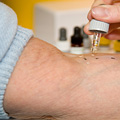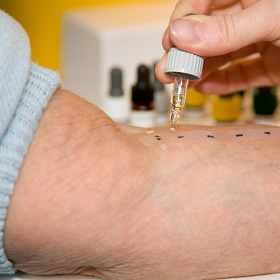
A skin prick test or scratch test.
An allergy skin test exposes the skin to possible allergy-causing substances (allergen) to identify which of these substances trigger an allergic reaction in a person.
Your doctor determines when and how often it is appropriate for you to do this test. This test is useful to help your doctor diagnose a number of conditions such as:
- hay fever (allergy to inhaled allergens such as tree, grass pollens, moulds, dust)
- allergic rhinitis
- dermatitis
- asthma that is triggered by allergens
- food, penicillin, bee sting allergies
This test may not be recommended if you take medications that can interfere with the results (e.g., antihistamines, some antidepressants, some heartburn medications), have a serious skin condition, or may be highly sensitive to the test allergens. In these cases, your doctor may recommend blood tests. Some people may be able to stop medications that affect the test before having the test. Your doctor will suggest what is best for you.
Risks and precautionsAllergy testing is usually a straightforward and safe procedure. However, there are some risks of complications or side effects, including:
- anaphylaxis reaction (an immediate, life-threatening allergic reaction)
- hives (swollen, red, itchy bumps on the skin)
If you experience symptoms of a severe allergic reaction (e.g., shortness of breath; wheezing; or swelling of the mouth, tongue, or face) within a few days after skin allergy tests, get immediate medical attention.
It is important that you understand all the risks of complications and side effects of the allergy skin test, and what you or your doctor can do to manage them. For example, your doctor may suggest a corticosteroid cream (e.g., hydrocortisone) to treat hives. Make sure that your doctor is aware of all your concerns.
Some people may experience complications or side effects other than those listed. Check with your doctor if you notice any symptom that worries you after your test.
During the testThis test is usually performed by a doctor or nurse in a doctor's office. There are three main types of skin tests.
Puncture, prick, or scratch test: In this test, a small drop of allergen is pricked or scratched onto your skin. If the area develops a red, itchy, and raised bump in 12 to 15 minutes, it means the result is positive and you are allergic to the substance tested.
Intradermal test: The allergen extracts are injected into the skin. This test may be performed when the skin prick test is negative. If the area develops a red, itchy, and raised bump in 12 to 15 minutes, it means the result is positive and you are allergic to the substance tested.
Patch test: In this test, an allergen is attached to a patch, which is applied to your skin. You will wear the patch for 24 to 72 hours, after which your skin is checked for signs of an allergic reaction. During this time, you should avoid showering and heavy sweating. This test is commonly used to identify contact or allergic dermatitis.
This test is usually conducted on the arm or back. A person can be tested for multiple allergens at once. Usually a grid is used as a guide to separate the different allergen spots.
Your doctor may order a blood allergy test if you cannot have a skin test. The blood test looks for antibodies in your body. This test, however, is not as sensitive as a skin test.
Before the testIt is important that you fully understand what the test involves beforehand. Ask your doctor to explain the risks, benefits, and drawbacks of the test, and don't be shy to probe further until you are comfortable with your doctor's responses.
There are no specific preparations before the test. Your doctor will likely obtain a detailed medical history from you and conduct a physical examination before starting the test. It is important to note that taking some medications (e.g., antihistamines, some antidepressants, some medications for heartburn) can lead to a false negative result.
If you are taking any prescription or over-the-counter (non-prescription) medications, supplements, or herbal products, make sure you inform your doctor or pharmacist. Ask them whether it is necessary for you to stop taking any of these medications and products before an allergy skin test. It is also important to tell them if you have allergies to certain medications, bandages, latex, or have other medical conditions.
After the testIf your allergy result is positive, you will develop a red, itchy, and raised bump on your skin. After the test result is interpreted, your health care provider will cleanse the test surface with alcohol.
The result of a skin test is not always accurate. If you received a positive result, discuss with your doctor what you can do to reduce or eliminate the symptoms of allergic reactions, such as avoiding allergens, taking medications, or receiving immunotherapy (allergy shots).

A skin prick test or scratch test.